AWM41 1041 - [Nurses Narratives] Sister A N Smith - Part 1
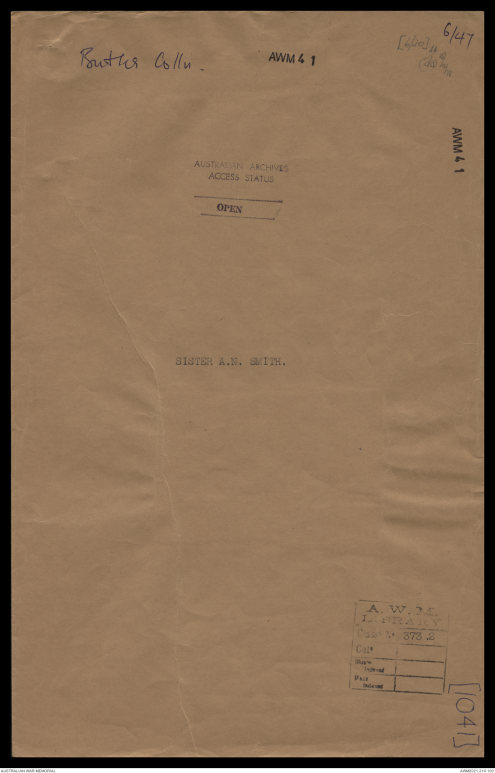
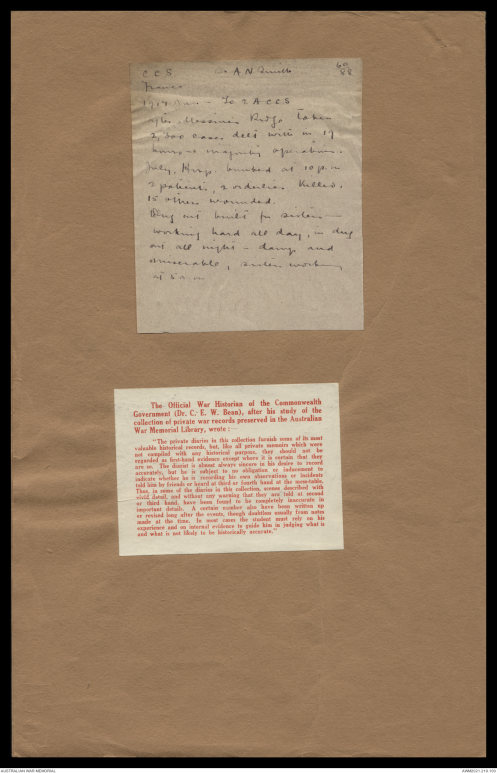
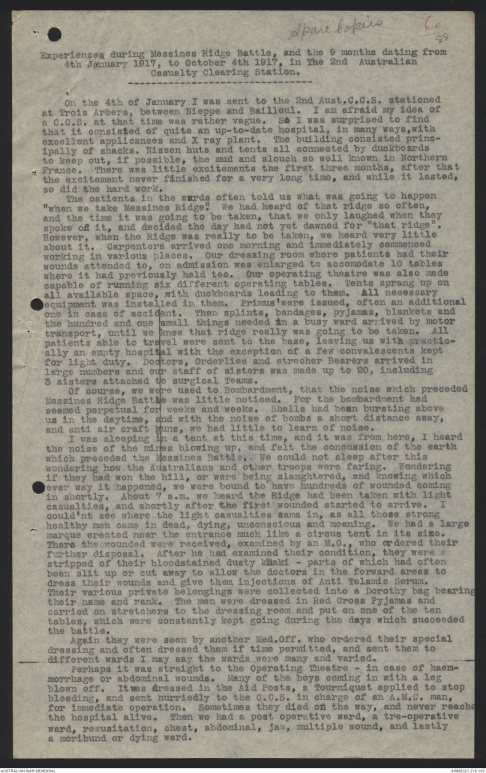
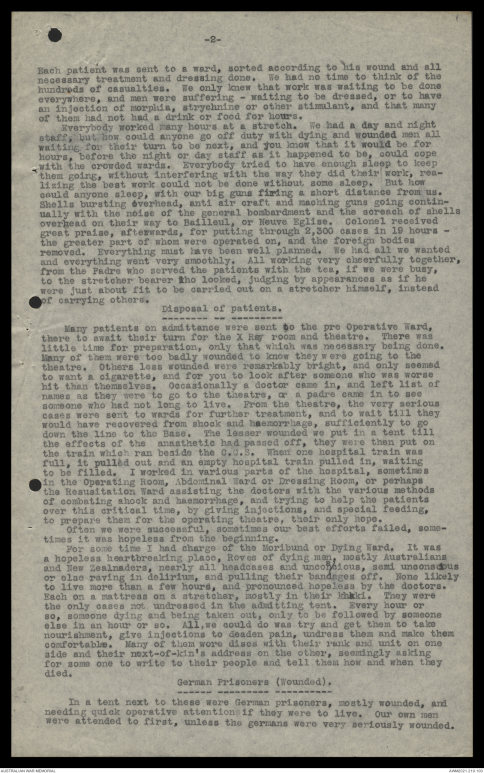
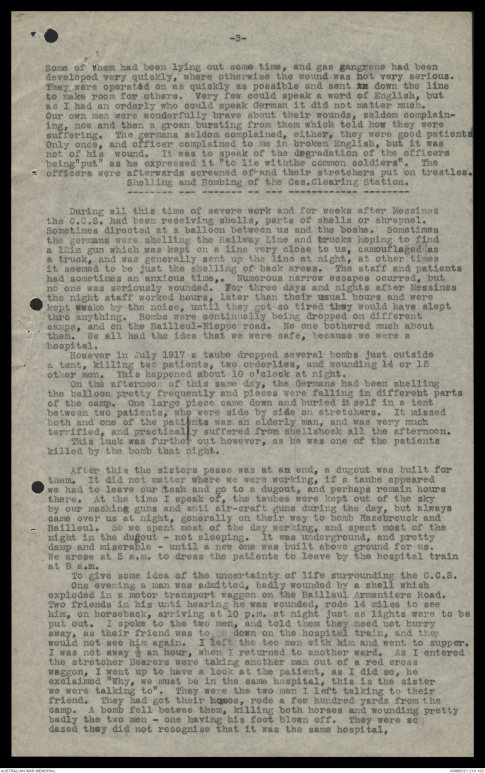
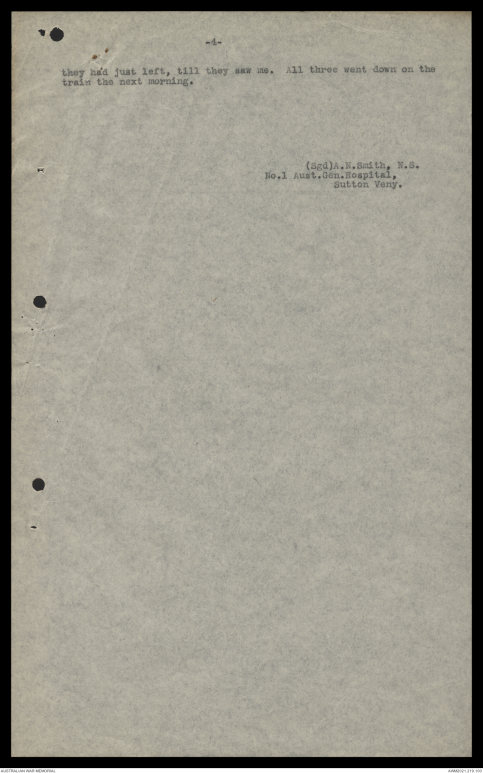
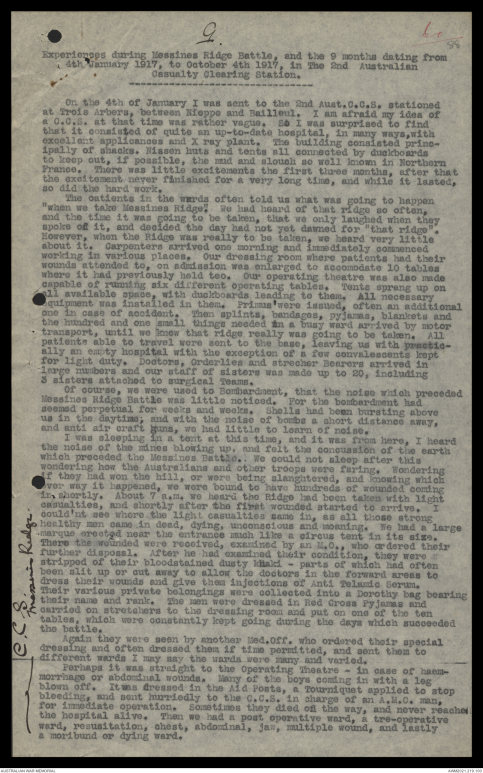
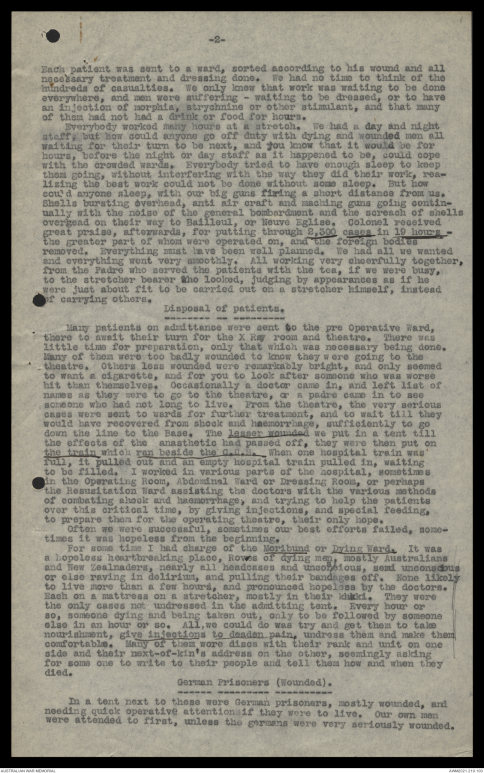
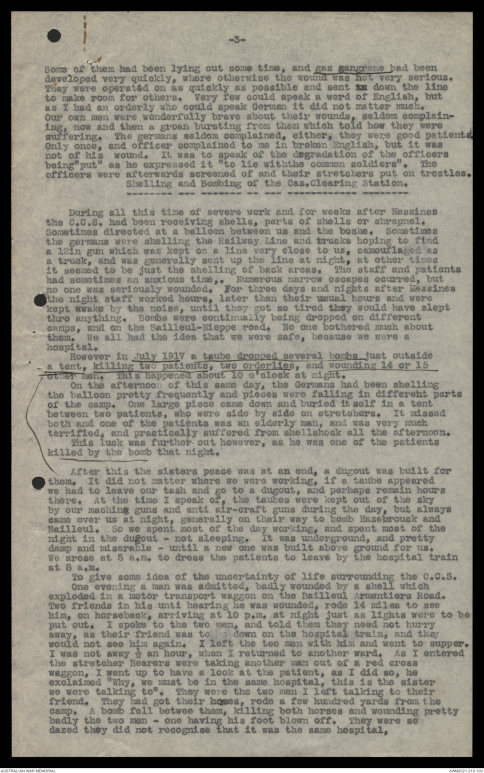
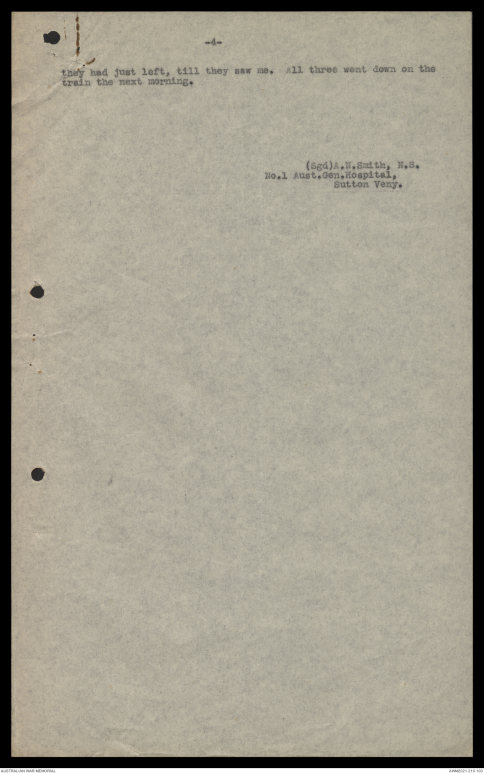
6/47
[6/20] AA
[[?]]
Butler Colln
AWM 4 1
AWM 4 1
AUSTRALIAN ARCHIVES
ACCESS STATUS
OPEN
SISTER A.N. SMITH.
A. W. M.
LIBRARY
Classn 373.2
[[?]]
[[?]]
[[?]]
[1041]
C.C.S.
France
Sr A. N. Smith
60/88
1917 [[?]] To 2 ACCS
after Messines Ridge Taken
2,300 cases [[?]] with in 19
hours [[?as?]] majority operation.
July, Huns bombed at 10 p.m.
2 patients , 2 orderlies killed.
15 men wounded.
Dug out built for sisters -
working hard all day, - day and
all night -
amicable, sisters working
at 5 a.m.
The Official War Historian of the Commonwealth
Government (Dr. C. E. W. Bean), after his study of the
collection of private war records preserved in the Australian
War Memorial Library, wrote : -
"The private diaries in this collection furnish some of its most
valuable historical records, but, like all private memoirs which were
not compiled with any historical purpose, they should not be
regarded as first-hand evidence except where it is certain that they
are so. The diarist is almost always sincere in his desire to record
accurately, but he is subject to no obligation or inducement to
indicate whether he is recording his own observations or incidents
told him by friends or heard at third or fourth hand at the mess-table.
Thus, in some of the diaries in this collection, scenes described with
vivid detail, and without any warning that they are told at second
or third hand, have been found to be completely inaccurate in
important details. A certain number also have been written up
or revised long after the events, though doubtless usually from notes
made at the time. In most cases the student must rely on his
experience and on internal evidence to guide him in judging what is
and what is not likely to be historically accurate."
Spare Copies
60/88
Experiences during Messines Ridge Battle, and the 9 months dating from
4th January 1917, to October 4th 1917, in The 2nd Australian
Casualty Clearing Station.
--------------------------------------------
On the 4th of January I was sent to 2nd Aust. C.C.S. stationed
at Trois Arbers, between Dieppe and Bailleul. I am afraid my idea of
a C.C.S. at that time was rather vague. So I was surprised to find
that it consisted of quite an up-to-date hospital, in many ways,with
excellent applications and X Ray plant. The building consisted principally
of shacks. Nissen huts and tents all connected by duckboards
to keep out, if possible, the mud and slouch so well known in Northern
France. There was little excitement first three months, after that
the excitement never finished for a very long time, and while it lasted,
so did the hard work.
The oatients in the wards often told me what was going to happen
"when we take Messines Ridge." We had heard of that ridge so often
and the time it was going to be taken, that we only laughed when they
spoke of it , and decided the day had not yet dawned for "that ridge".
However, when the Ridge was really to be taken, we heard very little
about it. Carpenters arrived one morning and immediately commenced
working in various places. Our dressing room where patients had their
wounds attended to, on admission was enlarged to accommodate 10 tables
where it previously held two our operating theatre was also made
capable of running six different operating tables. Tents sprang up on
all available space, where with duckboards leading to them.
All necessary
equipment was installed in them. Primus'were issued, often an additional
one in case of accident. Then splints, bandages, pyjamas, blankets and
the hundred and one small things needed in a busy ward arrived by motor
transport, until we knew that the ridge was going to be taken. All
patients able to travel were sent to the base, leaving us with practically
an empty hospital with the exception of a few convalescents kept
for light duty. Doctors, Orderlies and stretcher Bearers arrived in
large numbers and our staff of sisters was made up to 20, including
3 sisters attached to surgical Teams.
Of course, we were used to Bombardment, that the noise which preceded
Messines Ridge Battle was little noticed. For the bombardment had
seemed perpetual for weeks and weeks. Shells had been bursting above
us in the daytime, and with the noise of the bombs a short
distance away,
and anti aircraft guns, we had little to learn of noise.
I was sleeping in a tent at this time, and it was from here, I heard
the noise of the mines blowing up, and felt the concussion of the earth
which preceded the Messines Battle. We could not sleep after this
wondering how the Australians and other troops were faring.
Wondering
if they had won the hill, or were being slaughtered, and knowing which
ever way it happened, we were bound to have hundreds of wounded coming
in shortly. About 7 a.m. we heard that the Ridge had been taken with light
casualties, and shortly after the first wounded started to arrive. I
could'nt see where the light casualties came in, as all those strong
healthy men came in dead, dying, unconscious and moaning. We had a large
marquee created near the entrance much like a circus tent in its size.
There the wounded were received, examined by an M.O., who ordered their further disposal. After he examined their condition, they were
stripped of their bloodstained dusty khaki - parts of which had often
been slit up or cut away to allow the doctors in the forward areas to
dress their wounds and give them injections of Anti Telamic Serum.
Their various private belongings were collected into a Dorothy bag bearing
their name and ranks. The men were dressed in Red Cross Pyjamas and
carried on stretchers to the dressing room and put on one of the ten
tables, which were constantly kept going during the days which succeeded
the battle.
Again they were seen by another Med.Off. who ordered their special
dressing and often dressed them if time permitted, and sent them to
different wards I may say the wards were many and varied.
Perhaps it was straight to the Operating Theatre - in case of haemorrhage or abdominal wounds. Many of the boys coming in with a leg
blown off. It was dressed in the Aid Posts, a Torniquet applied to stop
bleeding, and sent hurriedly to the C.C.S. in charge of an A.M.C. man,
for immediate operation. Sometimes they died on the way, and never reached
the hospital alive. Then we had a post operative ward, a
tre-operative
ward, resusitation, chest, abdominal, jaw, multiple wound, and lastly
a morbid or dying ward.
.
-2-
Each patient was sent to a ward, sorted by according to his wound and all
necessary treatment and dressing done. we had no time to think of the
hundreds of casualties. We only knew that work was waiting to be done
everywhere, and men were suffering - waiting to be dressed, or to have
an injection of morphia, strychnine or other stimulant, and that many
of them had not had a drink or food for hours.
Everybody worked many hours at a stretch. We had a day and night
staff, but how could anyone go off duty with dying and wounded men all
waiting for their turn to be next, and you know that it would be for
hours, before the night or day staff as it happened to be, could cope
with the crowded wards. Everybody tried to have enough sleep to keep
them going, without interfering with the way they did their work, realizing
the best work could not be done without some sleep. But how
could anyone sleep, with our big guns firing a short distance from us.
Shells bursting overhead, and air craft and machine guns going continually
with the noise of the general bombardment and the screach of shells
overhead on their way to Beilleul , or Neuve Eglise. Colonel received
great praise, afterwards, for putting through 2,300 cases in 19 hours -
the greater part of whom were operated on, and the foreign bodies
removed. Everything must have been well planned. We had all we wanted
and everything went smoothly. All working very cheerfully together,
for the Padre who served the patients with the tea, if we were busy,
to the stretcher bearer xhe looked, judging by his appearance as if he
were just about fit to be carried out on a stretcher himself, instead
of carrying others.
Disposal of patients.
----------- --- -----------
Many patients on admittance were sent to the pre Operative
Ward,
there to wait their turn for the X Ray room and theatre. There was
little time for preparation, only that which was necessary being done.
Many of them were too badly wounded to know they were going to the
theatre. Others less wounded were remarkably bright, and only seemed
to want a cigarette, and for you to look after someone who was worse
hit than themselves. Occasionally a doctor came in, and left list of
names as they were to go to the theatre, or a padre came in to see
someone who had not long to live. From the theatre, the very serious
cases were sent to wards for further treatment, and to wait till they
would have recovered from shock and haemorrhage, sufficiently to go
down the line to the Base. The lesser wounded we put in a tent till
the affects of the anasthetic had passed off, they were then
put on
the train which ran beside the C.C.S. When one hospital train was
full, it pulled out and an empty hospital train pulled in, waiting
to be filled. I worked in various parts of the hospital, sometimes
the Operating Room, Abdominal Ward or Dressing room, or perhaps
the Resusitation Ward assisting the doctors with various methods
of combatting shock and haemorrhage, and trying to help the patients
over this critical time, by giving injections, and special feeding,
to prepare them for the operating theatre, their only hope.
Often we were successful, sometimes our best efforts failed, sometimes
it was hopeless from the beginning.
for some time I had charge of the Moribund or Dying Ward. It was
a hopeless heartbreaking place, Roves of dying men, mostly Australians
and New Zealanders, nearly all headcases and unconscious, semi unconscious
or else raving in delirium, and pulling their bandages off. None likely
to live more than a few hours, and pronounced hopeless ness by the doctors.
Each on a mattress on a stretcher, mostly in their khaki. They were
the only cases not undressed in the admitting tent. Every hour of so,
someone dying and being taken out, only followed by someone
else in an hour or so. All we could do was try and get them to take
nourishment, give injections to deaden the pain, undress them and make them
comfortable. Many of them wore discs with their rank and unit on one
side and their next-of-kin's address on the other, seemingly asking
for some one to write to their people and tell them how and when they
died.
General Prisoners (Wounded)
---------- ------------ -------------
In a tent next to these were all the German prisoners, mostly wounded, and
needing quick operative attention if they were to live. Our own men
were attended to first, unless the germans were very seriously wounded.
-3-
Some of them had been lying out some time, and gas gangrene had been
developed very quickly, where otherwise the wound was not very serious.
They were operated on as quickly as possible and sent xx down the line
to make room for others. Very few could speak a word of English, but
as I had an orderly who could speak German it did not matter much.
Our own men were wonderfully brave about their wounds, seldom complaining,
now and then a groan bursting from them which told how they were
suffering. The germans seldom complained, either, they were good patients.
Only once, and Officer complained to me in broken English, but it was
not of his wound. It was to speak of the degradation of the officers
being "put" as he expressed it "to lie with common soldiers". The
officers were afterwards screened of and their stretchers put on trestles.
Shelling and Bombing of the Cas.Clearing Station.
----------- ---- ------------- --- ---- ----------------- ---------
During all this time of severe work and for weeks after Messines
The C.C.S. had been receiving shells, parts of shells or shrapnel.
Sometimes directed at a balloon between us and the boche. Sometimes
the germans were shelling the Railway Line and trucks hoping to find
a 12 in gun which was kept on a line very close to us, camouflaged as
a truck, and was generally sent up the line at night, at other times
it seemed to be just the shelling of back acres. The staff and patients
had sometimes an anxious time,. Numerous narrow escapes occurred, but
no one was seriously wounded. For three days and nights after Messines
the night staff worked hours, later than their usual hours and were
kept awake by the noise, until they got so tired they would have slept
thro anything. Bombs were continually being dropped on different
camps, and on the Bailleul-Nieppe road. No one bothered much about
them. We all had the idea that we were safe, because we were a
hospital.
However in July 1917 a taube dropped several bombs just outside
a tent, killing two patients, two orderlies and wounding 14 of 15
other men. This happened about 10 o'clock at night.
On the afternoon of this same day, the Germans had been shelling
the balloon pretty frequently and pieces were falling in different parts
of the camp. One large piece came down and buried itself in a tent between two patients, who were side by side on stretchers. It missed
both and one of the patients was an elderly man, and was very much
terrified, and practically suffered from shellshock all the afternoon.
This luck was further out however, as he was on of the patients
killed by the bomb that night.
After this the sisters peace was at an end, a dugout was built for
them. It did not matter where we were working, if a taube appeared
we had to leave our dash and go to a dugout, and perhaps remain hours
there. At the time I speak of, the taubes were kept out of the sky
by our machine guns and anti air-craft guns during the day, but always
came over us at night, generally on their way to bomb Hazebreuck and
Bailleul. So we spent most of the day working, and spent most of the
night in the dugout - not sleeping. It was underground, and pretty
damp and miserable - until a new one was built above the ground for us.
We arose at 5 a.m. to dress the patients to leave by the hospital train
at 8 a.m.
To give some idea of the uncertainty of life surrounding the C.C.S.
One evening a man was admitted, badly wounded by a shell which
exploded in a motor transport waggon on the Bailleul Armentiers Road.
Two friends in his unti hearing he was wounded, rode 14 miles to see
him, on horseback, arriving at 10 p.m. at night just as lights were to be
put out. I spoke to the two men, and told them they need to hurry
away as their friend was to down on the hospital train, and they would not see him again. I left the two men with him and went to supper.
I was not away ½ an hour, when I returned to another ward. As I entered
the stretcher Bearers were taking out another man out of a red cross
waggon, I went to have a look at the patient, as I did so, he
exclaimed "Why , we must be in the same hospital, this is the sister
we were talking to". They were the two men I left talking to their
friend. They had got their horses, rode a few hundred yards from the
camp. A bomb fell betwee them, killing both horses and wounding pretty
badly the two men - one having his foot blown off. They were so
dazed they did not recognise that it was the same hospital.
-4-
they had just left , till they saw me. All three went dow on the train the next morning.
(Sgd) A.N. Smith, N.S.
No.1 Aust.Gen.Hospital,
Sutton Veny.
9.
Experiences during Messines Ridge Battle, and the 9 months dating from
4th January 1917, to October 4th 1917, in The 2nd Australian
Casualty Clearing Station.
--------------------------------------------
On the 4th of January I was sent to 2nd Aust. C.C.S. stationed
at Trois Arbers, between Dieppe and Bailleul. I am afraid my idea of
a C.C.S. at that time was rather vague. So I was surprised to find
that it consisted of quite an up-to-date hospital, in many ways,with
excellent applications and X Ray plant. The building consisted principally
of shacks. Nissen huts and tents all connected by duckboards
to keep out, if possible, the mud and slouch so well known in Northern
France. There was little excitement first three months, after that
the excitement never finished for a very long time, and while it lasted,
so did the hard work.
The oatients in the wards often told me what was going to happen
"when we take Messines Ridge." We had heard of that ridge so often
and the time it was going to be taken, that we only laughed when they
spoke of it , and decided the day had not yet dawned for "that ridge".
However, when the Ridge was really to be taken, we heard very little
about it. Carpenters arrived one morning and immediately commenced
working in various places. Our dressing room where patients had their
wounds attended to, on admission was enlarged to accommodate 10 tables
where it previously held two our operating theatre was also made
capable of running six different operating tables. Tents sprang up on
all available space, where with duckboards leading to them.
All necessary
equipment was installed in them. Primus'were issued, often an additional
one in case of accident. Then splints, bandages, pyjamas, blankets and
the hundred and one small things needed in a busy ward arrived by motor
transport, until we knew that the ridge was going to be taken. All
patients able to travel were sent to the base, leaving us with practically
an empty hospital with the exception of a few convalescents kept
for light duty. Doctors, Orderlies and stretcher Bearers arrived in
large numbers and our staff of sisters was made up to 20, including
3 sisters attached to surgical Teams.
Of course, we were used to Bombardment, that the noise which preceded
Messines Ridge Battle was little noticed. For the bombardment had
seemed perpetual for weeks and weeks. Shells had been bursting above
us in the daytime, and with the noise of the bombs a short
distance away,
and anti aircraft guns, we had little to learn of noise.
I was sleeping in a tent at this time, and it was from here, I heard
the noise of the mines blowing up, and felt the concussion of the earth
which preceded the Messines Battle. We could not sleep after this
wondering how the Australians and other troops were faring.
Wondering
if they had won the hill, or were being slaughtered, and knowing which
ever way it happened, we were bound to have hundreds of wounded coming
in shortly. About 7 a.m. we heard that the Ridge had been taken with light
casualties, and shortly after the first wounded started to arrive. I
could'nt see where the light casualties came in, as all those strong
healthy men came in dead, dying, unconscious and moaning. We had a large
marquee created near the entrance much like a circus tent in its size.
There the wounded were received, examined by an M.O., who ordered their further disposal. After he examined their condition, they were
stripped of their bloodstained dusty khaki - parts of which had often
been slit up or cut away to allow the doctors in the forward areas to
dress their wounds and give them injections of Anti Telamic Serum.
Their various private belongings were collected into a Dorothy bag bearing
their name and ranks. The men were dressed in Red Cross Pyjamas and
carried on stretchers to the dressing room and put on one of the ten
tables, which were constantly kept going during the days which succeeded
the battle.
Again they were seen by another Med.Off. who ordered their special
dressing and often dressed them if time permitted, and sent them to
different wards I may say the wards were many and varied.
Perhaps it was straight to the Operating Theatre - in case of haemorrhage or abdominal wounds. Many of the boys coming in with a leg
blown off. It was dressed in the Aid Posts, a Torniquet applied to stop
bleeding, and sent hurriedly to the C.C.S. in charge of an A.M.C. man,
for immediate operation. Sometimes they died on the way, and never reached
the hospital alive. Then we had a post operative ward, a
tre-operative
ward, resusitation, chest, abdominal, jaw, multiple wound, and lastly
a morbid or dying ward.
(*C.C.S.
Messines Ridge*)
-2-
Each patient was sent to a ward, sorted by according to his wound and all
necessary treatment and dressing done. we had no time to think of the
hundreds of casualties. We only knew that work was waiting to be done
everywhere, and men were suffering - waiting to be dressed, or to have
an injection of morphia, strychnine or other stimulant, and that many
of them had not had a drink or food for hours.
Everybody worked many hours at a stretch. We had a day and night
staff, but how could anyone go off duty with dying and wounded men all
waiting for their turn to be next, and you know that it would be for
hours, before the night or day staff as it happened to be, could cope
with the crowded wards. Everybody tried to have enough sleep to keep
them going, without interfering with the way they did their work, realizing
the best work could not be done without some sleep. But how
could anyone sleep, with our big guns firing a short distance from us.
Shells bursting overhead, and air craft and machine guns going continually
with the noise of the general bombardment and the screach of shells
overhead on their way to Beilleul , or Neuve Eglise. Colonel received
great praise, afterwards, for putting through 2,300 cases in 19 hours -
the greater part of whom were operated on, and the foreign bodies
removed. Everything must have been well planned. We had all we wanted
and everything went smoothly. All working very cheerfully together,
for the Padre who served the patients with the tea, if we were busy,
to the stretcher bearer xhe looked, judging by his appearance as if he
were just about fit to be carried out on a stretcher himself, instead
of carrying others.
Disposal of patients.
----------- --- -----------
Many patients on admittance were sent to the pre Operative
Ward,
there to wait their turn for the X Ray room and theatre. There was
little time for preparation, only that which was necessary being done.
Many of them were too badly wounded to know they were going to the
theatre. Others less wounded were remarkably bright, and only seemed
to want a cigarette, and for you to look after someone who was worse
hit than themselves. Occasionally a doctor came in, and left list of
names as they were to go to the theatre, or a padre came in to see
someone who had not long to live. From the theatre, the very serious
cases were sent to wards for further treatment, and to wait till they
would have recovered from shock and haemorrhage, sufficiently to go
down the line to the Base. The lesser wounded we put in a tent till
the affects of the anasthetic had passed off, they were then
put on
the train which ran beside the C.C.S. When one hospital train was
full, it pulled out and an empty hospital train pulled in, waiting
to be filled. I worked in various parts of the hospital, sometimes
the Operating Room, Abdominal Ward or Dressing room, or perhaps
the Resusitation Ward assisting the doctors with various methods
of combatting shock and haemorrhage, and trying to help the patients
over this critical time, by giving injections, and special feeding,
to prepare them for the operating theatre, their only hope.
Often we were successful, sometimes our best efforts failed, sometimes
it was hopeless from the beginning.
for some time I had charge of the Moribund or Dying Ward. It was
a hopeless heartbreaking place, Roves of dying men, mostly Australians
and New Zealanders, nearly all headcases and unconscious, semi unconscious
or else raving in delirium, and pulling their bandages off. None likely
to live more than a few hours, and pronounced hopeless ness by the doctors.
Each on a mattress on a stretcher, mostly in their khaki. They were
the only cases not undressed in the admitting tent. Every hour of so,
someone dying and being taken out, only followed by someone
else in an hour or so. All we could do was try and get them to take
nourishment, give injections to deaden the pain, undress them and make them
comfortable. Many of them wore discs with their rank and unit on one
side and their next-of-kin's address on the other, seemingly asking
for some one to write to their people and tell them how and when they
died.
General Prisoners (Wounded)
---------- ------------ -------------
In a tent next to these were all the German prisoners, mostly wounded, and
needing quick operative attention if they were to live. Our own men
were attended to first, unless the germans were very seriously wounded.
-3-
Some of them had been lying out some time, and gas gangrene had been
developed very quickly, where otherwise the wound was not very serious.
They were operated on as quickly as possible and sent xx down the line
to make room for others. Very few could speak a word of English, but
as I had an orderly who could speak German it did not matter much.
Our own men were wonderfully brave about their wounds, seldom complaining,
now and then a groan bursting from them which told how they were
suffering. The germans seldom complained, either, they were good patients.
Only once, and Officer complained to me in broken English, but it was
not of his wound. It was to speak of the degradation of the officers
being "put" as he expressed it "to lie with common soldiers". The
officers were afterwards screened of and their stretchers put on trestles.
Shelling and Bombing of the Cas.Clearing Station.
----------- ---- ------------- --- ---- ----------------- ---------
During all this time of severe work and for weeks after Messines
The C.C.S. had been receiving shells, parts of shells or shrapnel.
Sometimes directed at a balloon between us and the boche. Sometimes
the germans were shelling the Railway Line and trucks hoping to find
a 12 in gun which was kept on a line very close to us, camouflaged as
a truck, and was generally sent up the line at night, at other times
it seemed to be just the shelling of back acres. The staff and patients
had sometimes an anxious time,. Numerous narrow escapes occurred, but
no one was seriously wounded. For three days and nights after Messines
the night staff worked hours, later than their usual hours and were
kept awake by the noise, until they got so tired they would have slept
thro anything. Bombs were continually being dropped on different
camps, and on the Bailleul-Nieppe road. No one bothered much about
them. We all had the idea that we were safe, because we were a
hospital.
However in July 1917 a taube dropped several bombs just outside
a tent, killing two patients, two orderlies and wounding 14 of 15
other men. This happened about 10 o'clock at night.
On the afternoon of this same day, the Germans had been shelling
the balloon pretty frequently and pieces were falling in different parts
of the camp. One large piece came down and buried itself in a tent between two patients, who were side by side on stretchers. It missed
both and one of the patients was an elderly man, and was very much
terrified, and practically suffered from shellshock all the afternoon.
This luck was further out however, as he was on of the patients
killed by the bomb that night.
After this the sisters peace was at an end, a dugout was built for
them. It did not matter where we were working, if a taube appeared
we had to leave our dash and go to a dugout, and perhaps remain hours
there. At the time I speak of, the taubes were kept out of the sky
by our machine guns and anti air-craft guns during the day, but always
came over us at night, generally on their way to bomb Hazebreuck and
Bailleul. So we spent most of the day working, and spent most of the
night in the dugout - not sleeping. It was underground, and pretty
damp and miserable - until a new one was built above the ground for us.
We arose at 5 a.m. to dress the patients to leave by the hospital train
at 8 a.m.
To give some idea of the uncertainty of life surrounding the C.C.S.
One evening a man was admitted, badly wounded by a shell which
exploded in a motor transport waggon on the Bailleul Armentiers Road.
Two friends in his unti hearing he was wounded, rode 14 miles to see
him, on horseback, arriving at 10 p.m. at night just as lights were to be
put out. I spoke to the two men, and told them they need to hurry
away as their friend was to down on the hospital train, and they would not see him again. I left the two men with him and went to supper.
I was not away ½ an hour, when I returned to another ward. As I entered
the stretcher Bearers were taking out another man out of a red cross
waggon, I went to have a look at the patient, as I did so, he
exclaimed "Why , we must be in the same hospital, this is the sister
we were talking to". They were the two men I left talking to their
friend. They had got their horses, rode a few hundred yards from the
camp. A bomb fell betwee them, killing both horses and wounding pretty
badly the two men - one having his foot blown off. They were so
dazed they did not recognise that it was the same hospital.
-4-
they had just left , till they saw me. All three went dow on the train the next morning.
(Sgd) A.N. Smith, N.S.
No.1 Aust.Gen.Hospital,
Sutton Veny.
 Sam scott
Sam scottThis transcription item is now locked to you for editing. To release the lock either Save your changes or Cancel.
This lock will be automatically released after 60 minutes of inactivity.